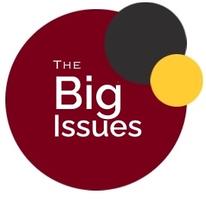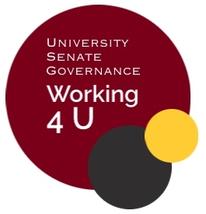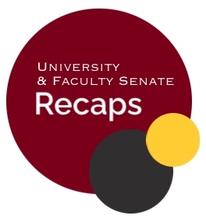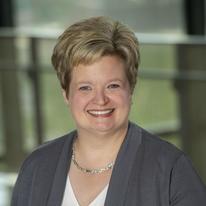A Message from the Chair
Professor Colleen Flaherty Manchester, chair, Senate/Faculty Consultative Committees

As another semester draws to a close, I write to you in my role as chair of the consultative committees of the University Senate (SCC) and the Faculty Senate (FCC) to reflect on the shared governance work from fall semester and put this work in a broader context. SCC and FCC Vice Chair Mark Bee and I are calling this the 4 Ps: The purpose of shared governance, the priorities of the SCC and FCC, the progress made this semester, and plans for the spring semester.
Purpose: At the University of Minnesota, shared governance refers to the system by which the Board of Regents, the administration, and the faculty, staff, and students jointly share responsibilities for developing policies and making decisions that impact the institution.
In practice, the University Senate and its four constituent senates (the Student, Civil Service, P&A, and Faculty Senates) and their committees represent the voices of students, staff, and faculty on all matters relating to the educational and administrative affairs of the University. The SCC and FCC play key roles in this system, such as hearing concerns of constituents and advising administration (consultative charge), setting the University and Faculty Senate agendas (executive charge), and keeping tabs on the work of committees (steering charge).
Priorities: The SCC and FCC have amplified their efforts to hear from constituents over the past year. From informal small group meetings to more formal listening sessions, these consultative committees—as well as the Civil Service and P&A Consultative Committees—are continually working on how to enhance two-way communication with constituents.
Based on these efforts, the SCC and FCC’s priorities this academic year overlap somewhat, and include the following:

Progress & Plans: For its reinvestment priority, the FCC is building on input from faculty senators and constituents to shape a set of priority areas to advance at the University. The FCC has elevated the importance of three Rs—recruiting, rewarding, and retaining—to administration and the Board of Regents. These three Rs apply to faculty, as well as more broadly to all employees at the University. This effort dovetails with the SCC’s priority of advocating for a long-term human capital investment plan at the University. This spring, the FCC and SCC plan to coordinate with the consultative committees of all four constituent senates on this goal.
This fall, the SCC has been actively seeking additional information on the implementation of, communication around, and implications of the PEAK Initiative. Consultative committee leaders are working to determine how shared governance can help increase the likelihood that PEAK meets its goals, as well as mitigate possible unintended consequences of the changes affecting staff, students, and faculty.
Fixed-term faculty and academic professionals who directly contribute to our mission through teaching and research are central to our University. The FCC has committed to creating space within shared governance to address the concerns of this constituency. A new subcommittee, the Term Faculty and Academic Professionals Subcommittee, is in its first year and is chaired by Katherine Dowd, administrative director, School of Mathematics. In addition, the Faculty Senate passed a resolution authored by the Academic Freedom and Tenure Committee that sets up a task force to examine questions of academic freedom protections for this group, as well as highlights reporting of fixed-term faculty appointments with an eye towards informing a broader conversation on their contribution to delivering on the University’s mission.
Looking internally within the senates, a priority for both SCC and FCC has been to work with University Senate Office staff on initiatives aimed at increasing transparency and inclusion in shared governance, specifically around how legislative actions move through committees on their way to the University and Faculty Senates. These initiatives affect how resolutions are introduced on the senate floor, and led to a new action tracking system available on the University Senate Office homepage. Looking to spring, there will be votes on changes to the University Senate’s Constitution, Bylaws, and Rules to align with current practices and revise the process for calling special meetings of the senate.
Perhaps there is a final P to consider—your participation. In a time when workloads seem never to decrease, and recovery from the pandemic for many has not been realized, why is it important to continue to engage in shared governance? This is an established path for your input and comments to reach those in decision-making positions, and, therefore, being reflected in our University’s practice and policies.
I encourage each of you to share your ideas and concerns with your elected senators and senate leadership. I would also encourage each of you to get involved with shared governance by running for the senate or applying for membership on a senate committee.
I want to close by thanking each of you who have invested time and effort into shared governance work through serving as a senator, contributing as a committee member, or engaging otherwise in shared governance. I sincerely value your involvement and participation. Best wishes to you and yours.
The Big Issues

The work of the University and Faculty Senates is accomplished primarily through their standing committees and subcommittees. Faculty, academic professionals, civil service staff, students, and administrators have designated positions on most committees.
Academic Freedom and Term Appointments
The Academic Freedom and Tenure Committee (AF&T) drafted a resolution in May of 2022 titled Resolution Concerning Academic Freedom and Term Appointments at the University of Minnesota. The resolution was discussed at the September 2022 Faculty Senate meeting and approved by the same body at its November meeting. The two-fold purpose of the resolution is to create a task force under the supervision of AF&T, which would identify and review cases of non-tenure-track and faculty-like appointments being used incorrectly (according to the Board of Regents Policy: Faculty Tenure); and to propose policy and procedure for protecting the academic freedom of those with non-tenure-track and faculty-like appointments, similar to the protections that are provided for tenured/tenure-track faculty.
Wellbeing Program
The Office of Human Resources (OHR) brought forth a proposed redesign to the Wellbeing Program in fall 2022 to many governance groups, including the Senate Committee on Faculty Affairs, the Faculty Consultative Committee, the P&A Consultative Committee, the P&A Benefits and Compensation Subcommittee, the Civil Service Consultative Committee, and the Civil Service Compensation and Benefits Subcommittee. Proposed changes included removing the premium reduction to the medical plan and giving all employees $200 towards wellbeing activities or items. Governance groups gathered feedback from their constituents in myriad ways and presented it to OHR for consideration. In general, University community members who submitted feedback felt this was not an appropriate time to remove the reduced premium. OHR has decided to keep the premium incentive in place through calendar year 2025, and expand Wellbeing Program opportunities to all University employees.
Professional Development Modules on Disability
This semester, several committees received a preview of three modules on supporting students with disabilities. The modules under development are the result of a 2019 resolution from the Disabilities Issues Committee and the subsequent Task Force on Disability Accommodations in the Learning Environment. Taking the lead on this project are Tina Marisam, associate vice president, Office for Equity and Diversity, and Donna Johnson, who formerly served as the director of the Twin Cities Disability Resource Center and is now project manager for this initiative. The three modules focus on foundations of disability, access, and inclusion; reasonable accommodations; and inclusive course design. In addition to the overview, various individuals across the institution were given the opportunity to provide slide-by-slide feedback on module content. The modules will be required for all instructional faculty and staff and are anticipated to launch this spring or during the 2023-24 academic year.
Response to Regent Sviggum's Comments on Diversity
Two committees, the Equity, Access, and Diversity Committee (EAD) and the Senate Consultative Committee (SCC), took legislative action in response to Regent Steve Sviggum's comments regarding diversity on the Morris campus at the October Board of Regents Mission Fulfillment Committee meeting. EAD wrote a letter in support of Morris’s commitment to recognizing and engaging with Native American communities; to underscore the value of a diverse community; and to request that the Board consider taking measures to address the impact of Sviggum’s comments. Likewise, the SCC sent a letter to members of the Board outlining why the committee believes the Board may have violated its own Code of Conduct, and requesting a careful review of the policy. Chair Kendall Powell responded to the SCC letter stating that he is committed to ensuring that diversity, equity, and inclusion remain top priorities for the Board. He also told the committee that he intends to have members of the Board take diversity and equity training. SCC Chair Professor Colleen Flaherty Manchester, has further engaged with Board leadership on the details of this training and stated in her December report to the Board that “the SCC is keenly interested in the Board’s commitment to diversity and inclusion training, including whether the University’s own expertise could be leveraged in this pursuit, and how the University might use this experience more broadly as an opportunity to reflect and lead.”
A View from the Inside: When Words Speak Louder Than (Legislative) Actions

Amber Bathke and Chris Kwapick, University Senate Office staff
When planning advocacy initiatives through University Senate governance, most people think first of a resolution or other legislative action. But there’s another conduit for change, which often flies under the radar—simple, old-fashioned conversation!
Frequently, administrators visit committees to talk about a certain topic, either because the committee is seeking information, or because the administrator is seeking feedback. University Senate Office staff also encourage groups or individuals engaged in advocacy to meet with relevant administrators early on in the process. It’s more common than you might think for administrators to implement suggestions that come up during these conversations, without the need for further advocacy. A few examples are described below.
- In 2018, members of the Lactation Advocacy Committee contacted the chair of the Senate Committee on Educational Policy (SCEP), seeking clarification that time to express milk was a legitimate absence under Administrative Policy: Makeup Work for Legitimate Absences. When SCEP discussed this proposal, relevant administrators stated that this absence was implied "under conditions related to pregnancy," but could be made explicit through an FAQ. Committee members agreed, and the FAQ was approved at the next meeting.
- Another example involving SCEP and Makeup Work for Legitimate Absences was a request from the PSEO Student Association in April 2020. Then-president Jonah Martinez visited SCEP to advocate for a revision that would designate taking standardized, college entry tests at their high schools as a legitimate absence for PSEO students. Prior to visiting SCEP, Martinez met with Office of Undergraduate Education (OUE) staff, who expressed support for this change during the SCEP meeting. The committee held a vote at its May meeting and approved the change, which was implemented in October 2020.
- In spring 2022, Disabilities Issues Committee Chair David Johnson sent an informal email to Ken Horstman, vice president, Office of Human Resources (OHR), regarding an email to all Twin Cities employees about the Drug-Free Campus policy. At the suggestion of a few members of the committee, Chair Johnson requested that in future iterations of this email (which goes out periodically), OHR include information on resources for those struggling with or in recovery from substance use issues, and provided suggested wording. (Though this was a written communication, it was not a formal letter from the committee; sometimes informal conversations are digital!) OHR included the suggested wording in the email that was sent just a few days ago.
- Just this fall, Student Senate Chair Pavan Guttipatti advocated for a mechanism by which students could access the syllabus for each course (if available) once they register for classes for the following semester. Constructive conversations with OUE revealed that implementing such a change was not only possible, it could be done in a timely manner. Thus, no legislative action was required.
- A similar situation occurred when Christopher Stallard, College of Liberal Arts student senator, drafted a resolution calling for an increase in stipends for undergraduate research programs in order to keep up with inflation and increases in other student wages. He met with appropriate administrators from the Office of Undergraduate Research, who agreed that this was a worthwhile initiative and committed to taking action in the coming months.
When this type of interaction happens frequently, it may look from the outside as if governance isn’t doing much—but really it is a mark of successful governance. When mutual trust has been built through sincere consultation, compromise, and cooperation, there is less need for formal legislative action.
University Senate Governance Working For U

Each senate has an executive—or "consultative"—committee. Members of the consultative committees are elected to represent the respective bodies.
Senate Consultative Committee (SCC)
In addition to engaging with the Board of Regents around the Regent Sviggum's controversial comments (as described above), the SCC reviewed and approved final proposed changes to the University Senate Constitution, Bylaws, and Rules. The changes were proposed following an extensive two-year review by a work group including representatives from all constituencies in the SCC. The goals of the revisions are to update outdated language and processes; clarify some existing procedures; and reflect best practices in governance. The University Senate will vote on the changes in the spring semester. The SCC also spent time consulting on next steps associated with the PEAK Initiative, as well as discussing strategies for increasing engagement in shared governance at the University.
Faculty Consultative Committee (FCC)
The FCC spent the fall semester advocating for faculty constituents about how best to recognize efforts made by faculty, as well as how to reinvest in faculty following the pandemic. The committee met multiple times with Executive Vice President and Provost Rachel Croson to consider possible recognition mechanisms.
In addition, the FCC spent considerable time engaging with senior leaders and having internal discussions about the current state of faculty compensation, including how to recruit, retain, and reward faculty members. The committee met with Board of Regents chair Kendall Powell to discuss compensation issues, as well as Board conduct following Regent Sviggum’s public remarks in October.
In addition to these advocacy efforts, the committee consulted on many important topics this semester, including a redesign of the Wellbeing Program; draft recommendations from the Faculty Misconduct Task Force; plans for an upcoming systemwide DEI Campus Climate Survey; and the Academic Freedom & Tenure Committee’s Resolution Concerning Academic Freedom and Term Appointments, recently passed by the Faculty Senate.
Student Senate Consultative Committee (SSCC)
The SSCC and Student Senate addressed a variety of issues this semester and met with personnel from across the system. Early in the semester, Vice President & Budget Director Julie Tonneson briefed the SSCC on the University’s overall budgeting process. This presentation helped student leaders gain a better understanding of the University's budget and how it impacts tuition, housing, scholarships, student wages, and other student financial considerations. Student Senate Vice Chair Adam Sychla authored a resolution regarding stipend and tuition transparency, calling for the creation of a database and archive of student tuition and stipends to help students better manage their finances. The Student Senate unanimously approved the resolution at its November meeting.
Also at its November meeting, Chief Government Relations Officer JD Burton briefed the Student Senate on the University’s legislative priorities for the 2023 legislative session, which include increased funding for core operations, public safety, and financial aid for Minnesota resident undergraduates. In addition, the SSCC and Student Senate held discussions with Vice Provost and Dean of Undergraduate Education Robert McMaster on possible revisions to the Twin Cities liberal education requirements for undergraduate students. Finally, student leaders engaged at multiple levels with the University’s Department of Public Safety (DPS) to better understand the different and emerging initiatives focused on creating a safer campus, especially in Dinkytown next to the Twin Cities campus. DPS liaison officer Nick Juarez met with the groups on two occasions to answer questions and provide further resources.
Civil Service Consultative Committee (CSCC)
CSCC priorities for the 2022-23 year include increasing the representation of civil service employees on the University Senate and other senate committees; addressing salary compression; and understanding how the PEAK Initiative will impact civil service jobs. This fall, the CSCC, as well as the Civil Service Compensation and Benefits Subcommittee, provided feedback to the Office of Human Resources (OHR) regarding changes to the University’s Wellbeing Program, which will take effect in 2025. To ensure broad feedback, the CSCC sent a survey to all civil service employees, information from which was conveyed to OHR in a letter. The CSCC also invited Stacey Tidball, associate vice provost, Academic Support Resources, and chair, Academic Calendar Task Force, to speak to equity considerations when recommending dates to the president for the Twin Cities floating holidays, a task which falls under CSCC's purview.
P&A Consultative Committee (PACC)
This year, PACC Chair Adolfo Carrillo Cabello and Chair-elect Whitney Taha Frakes expressed a commitment to conducting their work and advocacy on behalf of PACC, the P&A Senate, and all P&A employees at the University based on the principles of transparency, accountability, and inclusivity. Two areas of focus for PACC this year are increasing and improving the frequency and quality of engagement with members of the Board of Regents (BOR); and continuing to provide opportunities for P&A Senate members to increase their understanding of and involvement in University Senate governance.
With the Senate Consultative Committee (SCC), PACC co-authored a letter asking BOR members to review potential violations of the Board Policy: Code of Conduct based on Regent Steve Sviggum’s remarks during the BOR meeting on October 13, 2022. PACC also sent a letter to Teamsters 320 and the Office of Human Resources (OHR) in support of good faith negotiations and to affirm basic principles about the importance of living wages for all employees, as Teamsters 320 negotiated revisions to its contract with the University. PACC also focused substantial energy on facilitating and supporting the P&A Benefits and Compensation Subcommittee in compiling and reporting P&A Senate feedback to OHR on the proposed Wellbeing Program redesign.
Spotlight On: Mitch Zamoff
Written by Amber Bathke, senate associate, University Senate Office

At any given University or Faculty Senate meeting, members and guests have the opportunity to hear from a variety of personnel, including President Gabel, Provost Croson, and the chair of the Faculty and Senate Consultative Committees. One person senators don’t often see or hear from, however, is the senate parliamentarian—which is a shame, because currently serving in that role is Professor Mitch Zamoff of the Law School, who imparts great wit and wisdom at every turn, and somehow manages to do so in a way that puts everyone around him at ease.
The role of the parliamentarian is to advise the chair of the senate (President Gabel) on parliamentary procedure. It is a role that requires neutrality, guided by fairness and transparency, and Mitch insists upon those qualities in his work. “My role in senate governance is to provide advice that promotes a fair, consistent, and democratic forum to discuss the issues that are most important to this institution. This is consistent with my work as an attorney, dispute resolver, and professor who teaches students about the importance of due process and procedural consistency and transparency,” he says. As a result, he is careful to remain behind-the-scenes. But his mark is discernible nonetheless—every proceeding that runs smoothly and amiably is due in large part to Mitch’s guidance.
As part of his parliamentarian duties, Mitch also chaired a small working group tasked with reviewing the University Senate’s governing documents and making recommendations to increase transparency and consistency of the organization, as well as bring the documents into alignment with current practice and best practices. In the culmination of a years-long endeavor that began in 2019, the revisions are slated to be voted on at the senates in the spring.
Mitch is possessed of a calm, affable demeanor, which belies a high-octane career. Having grown up in the Washington, DC area, Mitch earned his undergraduate and law degrees at the University of Virginia. He then worked as a litigation attorney and federal criminal prosecutor, before moving to the Twin Cities in 2008 to become the general counsel of UnitedHealthcare. Prior to joining the faculty on a full-time basis in 2017, Mitch was a partner at an international law firm, where his practice focused on arbitration and mediation, among other things. Mitch is also a member of the American Arbitration Association Council and is a highly-regarded arbitrator and mediator—a skill that benefits the University community through his service as a hearing officer for student misconduct hearings. This year, Mitch was appointed assistant dean for experiential education at the Law School, and twice, he has received the Kinyon Teacher of the Year award. When asked about his most rewarding accomplishments, Mitch answers, “The achievements of which I am most proud are those of my students. It is an honor and privilege to play a role in their professional development and to advocate on their behalf. This job is so gratifying because there are many student successes to celebrate each year.”
When asked about the most important issues addressed in University Senate governance during his time as parliamentarian, Mitch’s answer was similarly gracious. “The senate was incredibly active during the height of the COVID pandemic. Issues ranging from public health to the core curriculum to DEI to campus safety to grading policies were tackled by the body. All of these topics are important,” he says. “But what often goes overlooked is all of the critical work that takes place at the committee level behind the scenes of the senate meetings themselves. The cumulative impact of all of this committee work is what is most impressive to me.”
In his free time, Mitch enjoys spending time outdoors and being active, notably hiking and playing tennis and, recently, pickleball. He is also an avid runner, having run 13 marathons. Surprising no one, he is also involved in several community service endeavors, both individually and with his family. “Service is about filling roles that need to be filled,” he says. During the last three and a half years, he has done more than fill the role of senate parliamentarian—he has defined and elevated it. Mitch will conclude his service in this role at the end of this academic year, but his contributions to University Senate governance will be felt for years to come.
University & Faculty Senate Meeting Recaps

Can't wait for the Semester Update to find out what happened at the University Senate meeting? Watch the Brief for post-meeting updates!
September 29, 2022
The University and Faculty Senates held their first meetings of the academic year on September 29th. At the University Senate, President Gabel spoke about newly appointed senior leaders and the search for a new chancellor of the Morris campus. She also reported that the All-University Honors Committee's namings workgroup would be reviewing honorary namings starting with the four oldest named University buildings: Folwell Hall (1906) and Sanford Hall (1910) on the Twin Cities campus, and Kiehle Hall (1910) and Spooner Hall (1912) on the Crookston and Morris campuses, respectively. Provost Croson updated senators about professional development modules for supporting students with disabilities, which are now in development.
At the Faculty Senate meeting, senators approved revisions to Administrative Policy: Commercialization of Intellectual Property as well as several educational policies, and discussed a resolution from the Academic Freedom & Tenure Committee concerning term appointments.
November 3, 2022
At the November 3 meeting of the University Senate, Senate Consultative Committee (SCC) Chair Colleen Flaherty Manchester reported on SCC advocacy regarding Regent Sviggum's comments about Morris. In addition, senators endorsed a new administrative policy, Occupational Health and Safety, and revisions to the charge for the Campus Committee on Student Behavior.
At the Faculty Senate meeting, members approved the Resolution Concerning Academic Freedom and Term Appointments at the University of Minnesota, as well as revisions to the Faculty Consultative Committee’s charge, which added official members from Rochester and Duluth.
December 1, 2022
At the University Senate meeting on December 1, senators approved minor updates to the Smoke and Tobacco Free Campus policy and heard from leadership about proposed revisions to the senate's own governing documents. These revisions are the result of a years-long project by the University Senate Office and a small working group of governance representatives, and aim to bring the governing documents in line with current practice; clarify certain procedures; and update names of titles, offices, and other outdated language.
The Faculty Senate discussed the recommendations of the Provost’s Task Force on Faculty Behavior in Graduate Education, and held a listening session about the use of internal University communications pertaining to labor negotiations.
Director's Note
Erin Heath, director, University Senate Office

What a year it has been!
December 6, 2022 marked my one-year anniversary in this role. Over this past year, I have had the opportunity to become better acquainted with numerous roles, responsibilities, policies, practices, procedures—you get the idea—within University Senate governance. While there is always more to learn, I continue to be amazed by the efforts and engagement of our committee and senate chairs and members and their continued investment in positively contributing to the effectiveness of the University community systemwide.
Recruiting and retaining engaged faculty, students, and staff to participate is critical to the effectiveness of shared governance. We are not alone in acknowledging the ongoing effects that time and other resource limitations have on continued engagement in light of other numerous priorities. Within the University Senate Office, we have taken the following steps, in collaboration with University Senate leadership, to further encourage participation and engagement, as well as help illustrate the benefits of involvement:
- Offering University and Faculty Senate meetings online to encourage equitable engagement of participants attending from greater Minnesota campuses, and those who may experience barriers to traveling to and from in-person meetings.
- Hosting some in-person small group meetings, such as the recently concluded fall 2022 brown bag sessions for committee leaders, to discuss identified priorities in more detail, while also providing opportunities to meet informally.
- Collaborating with the University Senate Office team on identifying opportunities to provide additional clarification regarding—and transparency to—our processes. One example is the creation of the legislative action tracker, which outlines the status of letters, statements, and resolutions drafted and endorsed by senate committees as they make their way through the consultation process.
I realize, like many others, that the “right” balance of online and in-person community continues to evolve, and that it may differ from one place to another. Within the University Senate, we will continue to listen and adapt so we may continue to work openly and effectively. And, if you would like to make your voice heard, please consider joining a committee or a senate. We are always looking for those who are interested in making a difference!
May each of you have a wonderful holiday season. See you next year!
Call for Nominations: Vickie R. Courtney Award for Outstanding Service to University Senate Governance

The Vickie R. Courtney Award for Outstanding Service to University Senate Governance recognizes faculty, students, and academic professional and administrative (P&A) and civil service staff systemwide who have made a significant impact on University Senate governance, have demonstrated a commitment to University Senate governance, and have served as an inspiration to others.
Award recipients will receive a one-time $1,000 stipend and an engraved plaque, and will be formally recognized at the April 27, 2023, University Senate meeting.
The deadline for submitting nominations to recognize individuals for their outstanding service to University Senate governance is Friday, March 3, 2023.
Please consider nominating a colleague who exemplifies the criteria. A complete description of the award and nomination requirements can be found on the Vickie R. Courtney Award for Outstanding Service to University Senate Governance webpage.